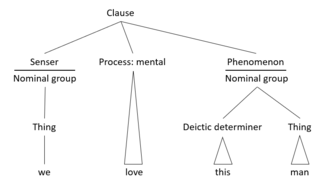Related Research Articles

Functional linguistics is an approach to the study of language characterized by taking systematically into account the speaker's and the hearer's side, and the communicative needs of the speaker and of the given language community. Linguistic functionalism spawned in the 1920s to 1930s from Ferdinand de Saussure's systematic structuralist approach to language (1916).

In linguistics, syntax is the study of how words and morphemes combine to form larger units such as phrases and sentences. Central concerns of syntax include word order, grammatical relations, hierarchical sentence structure (constituency), agreement, the nature of crosslinguistic variation, and the relationship between form and meaning (semantics). There are numerous approaches to syntax that differ in their central assumptions and goals.
In grammar, a phrase—called expression in some contexts—is a group of words or singular word acting as a grammatical unit. For instance, the English expression "the very happy squirrel" is a noun phrase which contains the adjective phrase "very happy". Phrases can consist of a single word or a complete sentence. In theoretical linguistics, phrases are often analyzed as units of syntactic structure such as a constituent. There is a difference between the common use of the term phrase and its technical use in linguistics. In common usage, a phrase is usually a group of words with some special idiomatic meaning or other significance, such as "all rights reserved", "economical with the truth", "kick the bucket", and the like. It may be a euphemism, a saying or proverb, a fixed expression, a figure of speech, etc.. In linguistics, these are known as phrasemes.
In grammar, a part of speech or part-of-speech is a category of words that have similar grammatical properties. Words that are assigned to the same part of speech generally display similar syntactic behavior, sometimes similar morphological behavior in that they undergo inflection for similar properties and even similar semantic behavior. Commonly listed English parts of speech are noun, verb, adjective, adverb, pronoun, preposition, conjunction, interjection, numeral, article, and determiner.
In linguistics, transformational grammar (TG) or transformational-generative grammar (TGG) is part of the theory of generative grammar, especially of natural languages. It considers grammar to be a system of rules that generate exactly those combinations of words that form grammatical sentences in a given language and involves the use of defined operations to produce new sentences from existing ones.
Linguistics is the scientific study of human language. Someone who engages in this study is called a linguist. See also the Outline of linguistics, the List of phonetics topics, the List of linguists, and the List of cognitive science topics. Articles related to linguistics include:

Generative grammar, or generativism, is a linguistic theory that regards linguistics as the study of a hypothesised innate grammatical structure. It is a biological or biologistic modification of earlier structuralist theories of linguistics, deriving from logical syntax and glossematics. Generative grammar considers grammar as a system of rules that generates exactly those combinations of words that form grammatical sentences in a given language. It is a system of explicit rules that may apply repeatedly to generate an indefinite number of sentences which can be as long as one wants them to be. The difference from structural and functional models is that the object is base-generated within the verb phrase in generative grammar. This purportedly cognitive structure is thought of as being a part of a universal grammar, a syntactic structure which is caused by a genetic mutation in humans.
A linguistic universal is a pattern that occurs systematically across natural languages, potentially true for all of them. For example, All languages have nouns and verbs, or If a language is spoken, it has consonants and vowels. Research in this area of linguistics is closely tied to the study of linguistic typology, and intends to reveal generalizations across languages, likely tied to cognition, perception, or other abilities of the mind. The field originates from discussions influenced by Noam Chomsky's proposal of a Universal Grammar, but was largely pioneered by the linguist Joseph Greenberg, who derived a set of forty-five basic universals, mostly dealing with syntax, from a study of some thirty languages.
Principles and parameters is a framework within generative linguistics in which the syntax of a natural language is described in accordance with general principles and specific parameters that for particular languages are either turned on or off. For example, the position of heads in phrases is determined by a parameter. Whether a language is head-initial or head-final is regarded as a parameter which is either on or off for particular languages. Principles and parameters was largely formulated by the linguists Noam Chomsky and Howard Lasnik. Many linguists have worked within this framework, and for a period of time it was considered the dominant form of mainstream generative linguistics.
In linguistics, especially within generative grammar, phi features are the morphological expression of a semantic process in which a word or morpheme varies with the form of another word or phrase in the same sentence. This variation can include person, number, gender, and case, as encoded in pronominal agreement with nouns and pronouns. Several other features are included in the set of phi-features, such as the categorical features ±N (nominal) and ±V (verbal), which can be used to describe lexical categories and case features.
In linguistics, head directionality is a proposed parameter that classifies languages according to whether they are head-initial or head-final. The head is the element that determines the category of a phrase: for example, in a verb phrase, the head is a verb. Therefore, head initial would be "VO" languages and head final would be "OV" languages.

Squamish is a Coast Salish language spoken by the Squamish people of the Pacific Northwest. It is spoken in southwestern British Columbia, Canada, centred on their reserve communities in Squamish, North Vancouver, and West Vancouver. An archaic historical rendering of the native Sḵwx̱wú7mesh is Sko-ko-mish but this should not be confused with the name of the Skokomish people of Washington state. Squamish is most closely related to the Sechelt, Halkomelem, and Nooksack languages.
Determiner, also called determinative, is a term used in some models of grammatical description to describe a word or affix belonging to a class of noun modifiers. A determiner combines with a noun to express its reference. Examples in English include articles, demonstratives, possessives, and quantifiers. Not all languages have determiners, and not all systems of grammatical description recognize them as a distinct category.
The Canadian Linguistic Association is the principal professional organization of linguists in Canada. Yearly meetings are held, usually at the end of May, in which members present scholarly research on any area of Linguistics. Every year since 2011, a new exhibit of the Canadian Language Museum has also opened at the annual meeting. The CLA also publishes the Canadian Journal of Linguistics, which is published quarterly. The association was founded in 1954.

Contrastive focus reduplication, also called contrastive reduplication, identical constituent compounding, lexical cloning, or the double construction, is a type of syntactic reduplication found in some languages. Doubling a word or phrase – such as "do you like-like him?" – can indicate that the prototypical meaning of the repeated word or phrase is intended.
"As a rough approximation, we can say that the reduplicated modifier singles out a member or subset of the extension of the noun that represents a true, real, default, or prototype instance."
Diane Massam is a Canadian linguist, Professor Emeritus at the University of Toronto.
Linguistics is the scientific study of language. Linguistics is based on a theoretical as well as a descriptive study of language and is also interlinked with the applied fields of language studies and language learning, which entails the study of specific languages. Before the 20th century, linguistics evolved in conjunction with literary study and did not exclusively employ scientific methods.

In linguistics, the term formalism is used in a variety of meanings which relate to formal linguistics in different ways. In common usage, it is merely synonymous with a grammatical model or a syntactic model: a method for analyzing sentence structures. Such formalisms include different methodologies of generative grammar which are especially designed to produce grammatically correct strings of words; or the likes of Functional Discourse Grammar which builds on predicate logic.
Veneeta Dayal is an American linguist. She is currently the Dorothy R. Diebold Professor of Linguistics at Yale University.

Artemis Alexiadou is a Greek linguist active in syntax research working in Germany. She is professor of English linguistics at the Humboldt University of Berlin.
References
- ↑ LinguistList
- ↑ Toronto Working Papers in Linguistics, http://twpl.library.utoronto.ca/index.php/twpl/issue/view/500
- 1 2 "University of Manitoba - Faculty of Arts - Linguistics - Jila Ghomeshi". Umanitoba.ca. Retrieved 2016-01-31.
- 1 2 Mayes, Alison (2011-01-13). "She'd like a few words with you". Winnipeg Free Press. Retrieved 2019-03-27.
- ↑ "Prix national d'excellence | National Achievement Awards". Archived from the original on June 1, 2015. Retrieved June 2, 2015.
- ↑ Ghomeshi, Jila. "Grammar Matters". ARP Books. Retrieved 2016-01-31.
- ↑ Ghomeshi, Jila; Paul, Ileana; Wiltschko, Martina (2009). Determiners: Universals and variation. John Benjamins Publishing. ISBN 978-90-272-8895-0.[ non-primary source needed ]
- ↑ "Mobile Menu". Benjamins.com. Retrieved 2016-01-31.
- ↑ "Canadian Linguistics Association National Achievement Award 2014". Canadian Journal of Linguistics. 59 (2): 299–300. July 2014. doi:10.1017/S0008413100000359. S2CID 231890565. Project MUSE 555340.
- ↑ Bilous, Rostyslav (2011). "Determiners: Universals and variation (review)". The Canadian Journal of Linguistics. 56 (1): 128–130. Project MUSE 429029.
- ↑ "Yes, Good Grammar Is (Still) Important, and Here's Why". ClearVoice. 2018-12-14. Retrieved 2019-03-27.
- ↑ Grammar Matters.
- ↑ Heather (2011-05-24). "Grammar Matters: The Social Significance of How We Use Language". The Word Blog. Retrieved 2019-03-27.